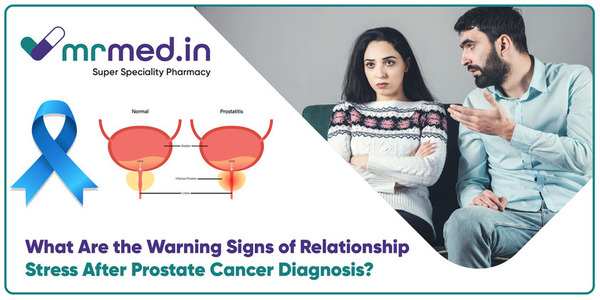A prostate cancer diagnosis is life-altering, not just for the patient but also for their relationships. The emotional and psychological toll can strain even the strongest bonds, leading to relationship stress. Recognising the warning signs of this stress is crucial for maintaining healthy relationships during and after treatment.
How does prostate cancer affect you emotionally?
Prostate cancer affects men’s emotional health in profound ways. It’s not just about the physical symptoms or the side effects of treatments like Pamorelin LA 22.5mg Injection, including Triptorelin, but also about the emotional upheaval that comes with a cancer diagnosis. This emotional strain can manifest in several ways:
- Depression and Anxiety: Feelings of sadness, hopelessness, or anxiety can arise, leading to withdrawal from loved ones.
- Irritability and Anger: Frustration with the illness or treatment can result in increased irritability or anger, which may be directed toward partners or family members.
- Fear of the Future: Uncertainty about the future can lead to stress and tension in relationships as partners struggle to cope with the unknown.
How does prostate cancer affect relationships?
The physical changes brought on by prostate cancer and its treatments can significantly impact intimate relationships. Here’s how:
- Sexual Dysfunction: Treatments for prostate cancer, can lead to sexual dysfunction, such as erectile dysfunction or reduced libido. This can create feelings of inadequacy or rejection in both partners.
- Fatigue and Weakness: Cancer-related fatigue can make it difficult for patients to engage in daily activities or maintain physical intimacy, leading to feelings of disconnection.
- Body Image Issues: Changes in appearance or physical capabilities can affect a patient’s self-esteem, impacting how they interact with their partner.
How does prostate cancer affect everyday life?
One of the most significant warning signs of relationship stress is a breakdown in communication. Here’s how it can manifest:
- Avoidance of Difficult Conversations: Partners may avoid discussing the challenges they’re facing, leading to unresolved issues and growing resentment.
- Misunderstandings and Assumptions: Lack of open communication can lead to misunderstandings, with each partner assuming they know what the other is feeling or thinking.
- Emotional Withdrawal: As stress builds, one or both partners may begin to withdraw, leading to further isolation and loneliness emotionally.
Why is prostate cancer awareness important?
Prostate Cancer Awareness plays a critical role in reducing relationship stress. By increasing understanding of the disease, its treatments, and its impact on relationships, couples can better navigate the challenges they face. Awareness can lead to:
- Open Communication: Understanding the emotional and physical effects of prostate cancer can encourage more open and honest communication between partners.
- Shared Decision-Making: Awareness allows both partners to participate in treatment decisions, fostering a sense of teamwork and mutual support.
- Access to Support Resources: Awareness campaigns often highlight available resources, such as counselling or support groups, that can help couples manage relationship stress.
Seeking Professional Help: When to Consider Counseling
Sometimes, relationship stress may reach a point where professional help is needed. Here’s when to consider counselling:
- Persistent Communication Issues: If communication breakdowns continue despite efforts to improve them, couples counselling can help.
- Severe Emotional Distress: If either partner is experiencing severe emotional distress, such as depression or anxiety, individual or couples therapy may be necessary.
- Struggles with Intimacy: Sexual counselling or therapy can help couples address issues related to sexual dysfunction or loss of intimacy.
Coping Strategies for Managing Relationship Stress
While recognising the warning signs is crucial, knowing how to cope with relationship stress is equally important. Here are some strategies:
- Open Communication: Make a conscious effort to communicate openly and honestly with your partner about your feelings, fears, and needs.
- Emotional Support: Offer and seek emotional support from each other. Sometimes, just knowing that you’re not alone can make a significant difference.
- Quality Time Together: Spend quality time together, focusing on activities that strengthen your bond, even if it’s something as simple as watching a movie or going for a walk.
- Seeking Help: If you’re struggling to cope with stress, don’t hesitate to seek help from a therapist or counselor.
The Importance of Self-Care in Relationships
Self-care is vital for both partners in a relationship affected by prostate cancer. Here’s why:
- Physical Health: Maintaining physical health through regular exercise, a healthy diet, and sufficient rest can improve one's ability to cope with stress.
- Mental Health: Engage in activities that promote mental well-being, such as mindfulness, meditation, or hobbies you enjoy.
- Personal Time: Ensure you both have time for yourselves, apart from your roles as partners or caregivers, to recharge and maintain a sense of individuality.
Rebuilding Intimacy After Prostate Cancer
Rebuilding intimacy after prostate cancer can be challenging, but it’s not impossible. Here’s how:
- Patience and Understanding: Recognize that intimacy may take time to rebuild, and be patient with each other during this process.
- Exploring New Ways to Connect: Be open to exploring new ways to connect intimately, such as through physical touch, affection, or emotional closeness.
- Seeking Professional Guidance: Consider seeking guidance from a sexual therapist or counsellor to help navigate any challenges.
Prostate cancer can be a significant source of stress in relationships, but by recognising the warning signs and taking proactive steps to address them, couples can navigate these challenges together. With open communication, emotional support, and a commitment to maintaining their relationship, couples can emerge from this experience stronger and more connected than ever.

